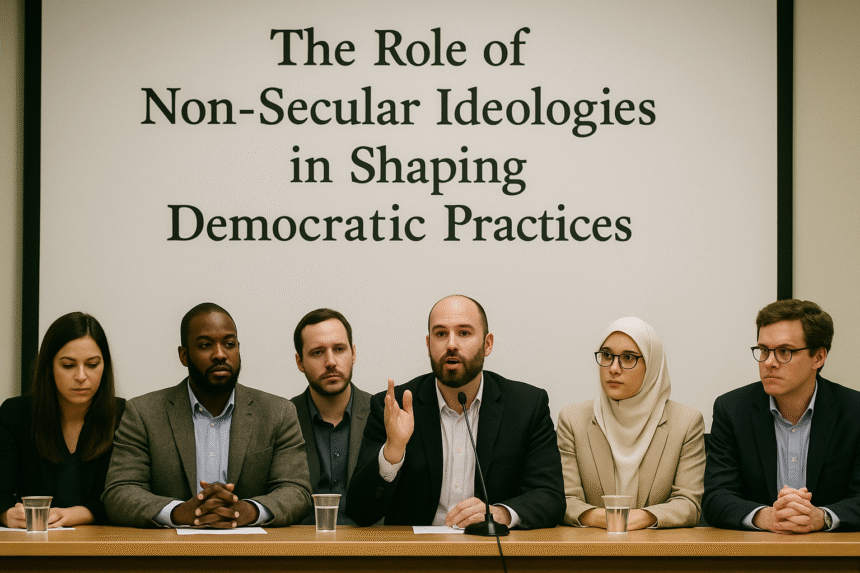New Delhi, India, 2025 — In diverse democracies like India, the interplay between non-secular ideologies and democratic principles has significant implications for governance, representation, and inclusivity. While secularism seeks to ensure neutrality in governance by separating religion from politics, non-secular ideologies often influence policies, challenging the foundational principles of equality and impartiality.
This article critically examines how non-secular ideologies shape democratic practices in India, supported by official data and insights.
Non-Secular Ideologies in Indian Democracy
1. Religious Influence on Policy-Making
India, while constitutionally secular, often sees religious ideologies influencing policy decisions.
- Example: The introduction of the Citizenship Amendment Act (CAA) in 2019, which fast-tracks citizenship for non-Muslim refugees from neighbouring countries, has been criticized for undermining secular principles.
- Data: The National Crime Records Bureau (NCRB) reported a 23% rise in communal incidents between 2020 and 2024, often linked to polarizing policies.
- Impact: Policies perceived as favouring one religion can deepen communal divides and erode trust in democratic institutions.
2. Role of Religious Organizations
Religious bodies frequently influence voter behaviour and political campaigns.
- Example: In the 2024 General Elections, reports from the Election Commission of India highlighted significant mobilization by religious groups urging voters to support specific candidates.
- Impact: While democratic participation is encouraged, such mobilization risks polarizing communities and prioritizing religious identities over developmental agendas.
Global Comparisons: Lessons for India
- United States
- The U.S., a secular democracy, faces challenges from religious lobbying groups influencing policies on abortion, education, and LGBTQ+ rights.
- Lesson: Regulatory frameworks to limit the political influence of religious entities are essential for maintaining secular governance.
- Turkey
- Turkey’s transition from secularism to a more religion-oriented governance model under the current regime illustrates how non-secular ideologies can erode judicial independence and minority rights.
- Lesson: India must safeguard institutional autonomy to prevent similar trends.
Challenges Posed by Non-Secular Ideologies in India
1. Marginalization of Minorities
- Data: A report by the National Human Rights Commission (NHRC) in 2024 noted a 15% decline in minority representation in local governance since 2019.
- Impact: Marginalization weakens the democratic promise of equal representation and justice.
2. Polarized Electoral Campaigns
- Example: Communal rhetoric in election campaigns, flagged by the Election Commission, has risen by 18% since 2019.
- Impact: Polarization undermines the democratic process, reducing elections to contests of identity rather than governance.
3. Judicial Implications
- Example: Legal decisions influenced by religious sentiments, such as the Ayodhya Verdict (2019), have sparked debates about the judiciary’s impartiality in non-secular democracies.
- Impact: Perceived bias in judicial rulings can erode public trust in democratic institutions.
India’s Path to Balancing Secularism and Democracy
- Strengthening Constitutional Protections
- Reinforcing Article 25 (freedom of religion) and Article 14 (equality before the law) ensures that democratic practices are not skewed by religious biases.
- Regulating Religious Influence in Politics
- The Election Commission of India must strictly enforce guidelines prohibiting the use of religion in electoral campaigns.
- Promoting Inclusive Policies
- Welfare programs should target economic and social upliftment irrespective of religious identities.
- Example: The success of the Pradhan Mantri Jan Dhan Yojana in reaching underprivileged communities across all religious groups highlights the importance of inclusive development.
Conclusion: Navigating a Delicate Balance
Non-secular ideologies have a profound impact on democratic practices, influencing policies, electoral behavior, and institutional integrity. In India, where religious diversity is both a strength and a challenge, the need to balance secularism with democratic inclusivity is critical.
By ensuring impartial governance, promoting inclusivity, and regulating religious influence, India can uphold the democratic values of equality, freedom, and justice while navigating the complexities of a multi-religious society. As the world watches, India’s ability to balance these forces will serve as a model for democracies grappling with similar challenges.


Leave a Reply